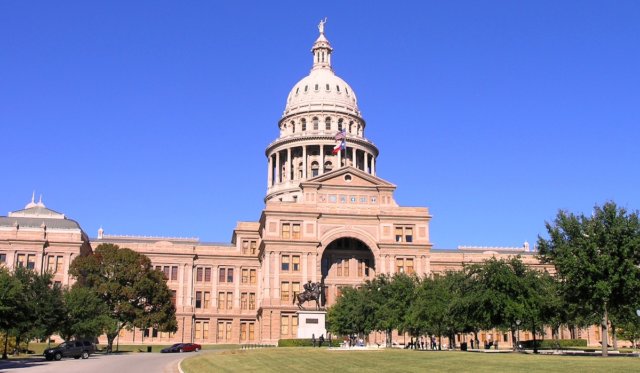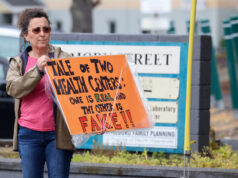AUSTIN, Texas — The danger of the Trump White House does not end with the Trump White House. It doesn’t end with the near-constant threat of nuclear war with North Korea. It doesn’t end with the clear encouragement of white supremacists in our streets either.
The danger of the Trump Era has a tail longer than one of the president’s ties. Its all-consuming chaos has the capacity to overpower and to shield some of the otherwise monstrous things coming out of our state and local governments.
Which, of course, brings me to Texas and the freshly inked legislative achievement described by its opponents as “rape insurance.”
Last Tuesday, while most of us were consumed with the horrific aftermath of the attack on Charlottesville, Virginia, human decency was taking another hit in the Texas Legislature’s no-good, very-bad special session.
A civics lesson for those unfamiliar with the way Texas governs itself: The Texas Legislature meets once every two years, for a period of 140 days. This, mandated by the Texas Constitution, despite presiding over one of the country’s largest economies and land masses. (It’s not as if it’s a fact they should forget since everything in the Capitol, right down to the doorjambs, has “Texas” emblazoned on it.)
That said, the governor — in this case, Greg Abbott — can convene as many special sessions as his heart desires. There is no limit on the number of special sessions that can be called between regular sessions, only a stipulation that each session will not last longer than 30 days. In theory, Abbott could call back the Legislature to rehash its many shortcomings on a month-by-month basis until everyone is dead or a new regular session begins — whichever might come first. Who knows in these exciting times!
This is about where we all felt we were this year when Abbott called a special session after the Legislature failed to pass a number of things, the most high-profile of which was the scurrilous “bathroom bill” that would have codified, in no uncertain terms, unconstitutional discrimination against transgendered people.
The hoopla over the bathroom bill — ultimately defeated, largely at the hands of world-weary House Speaker and Bush Republican Joe Straus — overshadowed a separate sinister effort: House Bill 214, which requires women in Texas to pay an added health insurance premium should they want coverage for so-called “non-emergency” elective abortions.
Emergency, in this context, is limited in scope to a medical emergency. There are no exceptions for rape or incest or severe fetal abnormalities. Rape and its very real, very biological consequences are not considered health emergencies in this state. Abbott made that clear when he signed the bill Tuesday.
My good friends in Oklahoma, of course, will understand the phenomenon of a state legislature seemingly obsessed with legislating women’s health above all else. It was no surprise here that House Bill 214 was a response to one of three abortion-related agenda items for the state House and Senate in this special session.
But that House Bill 214 passed and was signed, that it passed with as little high-decibel attention as it did, that it passed despite the assured harm it will cause to at-risk women — that is what I find most galling, even if I cannot call it gob-smacking or surprising.
Ending a pregnancy is not a recreational or planned activity. Few do it out of anything other than desperation. A fetus has a defect that will ensure a limited quality — and, maybe, quantity — of life. A woman cannot bear the physical and psychological toll of carrying with her the product of her abuse. The scenarios are vast, but serious.
The lead author of the bill, State Rep. John Smithee (R-Amarillo) wrapped his creation in the go-to language of the GOP: fiscal conservatism. (Never mind that the effort will invite endless and costly legal challenges.)
“This isn’t about who can get an abortion,” Smithee said, in a quote in The Texas Tribune. “It is about who is forced to pay for an abortion.”
It’s possible he believes that. It’s possible that Smithee and his raft of co-authors believe the burden of their restrictions will not fall on low-income, under-resourced women who will have nowhere to turn when tragedy or “non-medical emergency” strikes.
It’s possible these legislators believe seeing an unplanned pregnancy to term is easy or without consequence for women. It’s possible they believe these women will indeed do so and will not resort to riskier alternatives, in surely another blow to a state that already bears the highest maternal mortality rate in the developed world.
It’s even possible those same lawmakers have somehow missed the monthslong drum of headlines about Texas’ broken foster care system where children sleep more often in child welfare office buildings than in true beds.
I don’t find that likely.
If I could call a special session to undo the damage wrought, I would. If I could summon the Texas Legislature every 30 days from here to eternity to vote on nothing but funding for rape-kit testing, emphasis on sexual education, resources for Child Protective Services and more widely available access to health care, I would.
There are plenty of pro-life pieces of legislation to be drafted. House Bill 214 isn’t one of them.






















